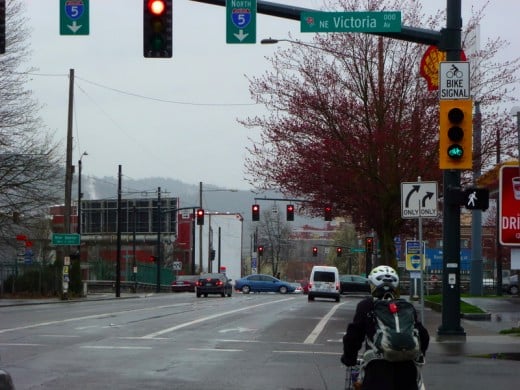
(Photo by Peter Koonce/PBOT)
The Portland Bureau of Transportation (PBOT) installed a new bike signal on NE Broadway and Victoria earlier this week. The signal is just one block east of the bike-only signal Williams that has been in operation since October 2010.
Unlike any other bike signal in the City, this new signal gives people on bikes a “pre-green” — meaning bike traffic gets to go several seconds ahead of car traffic. Here’s more from PBOT spokesman Dan Anderson:
“The goal of this treatment is to improve traffic flow by giving people on bikes more time to travel through the Victoria intersection, bike signal at N Williams and the N Vancouver intersection on their way to the Broadway Bridge. This is also called a “leading bicycle interval” in traffic engineer speak and will allow a wider range of cycling speeds access to the green wave”
This signal is also integrated with the one at Williams so that bike traffic gets a bit of a “green wave” when headed westbound on Broadway toward downtown.

is in charge of Portland’s traffic signals.
(Photo © J. Maus/BikePortland)
This is just the latest example of PBOT’s attention to bicycle traffic when planning signals and signal timing, thanks in large part to the head of PBOT’s Signals Division, Peter Koonce. Koonce not only uses a bicycle as his primary vehicle around town, he is also a nationally recognized expert in the field of “Intelligent Transportation Systems” (ITS).
Koonce was behind the signal timing changes that made the NE 12th overcrossing project possible and you might have noticed his handiwork while hitting all the greens biking north up Williams Avenue.
Bike signals will become more common throughout Oregon thanks to a new state law that went into effect January 1st of this year. Koonce, representing PBOT, was one of the laws key backers. During a hearing on the bill in February 2011, Koonce told lawmakers that, “Providing an exclusive signal display recognizes the differences between motor vehicles, bicycles and pedestrians… Increasing the predicable movements of all roadway users increases safety of all modes.”

